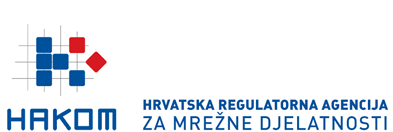HAKOM: Positive trends in cargo rail trafficPRESS RELEASEThe total amount of rail freight transport increased by 22 percent compared to the previous quarter of the same year
ZAGREB, 28 February 2017 - In the fourth quarter of 2016, an increased business activity by freight rail carriers was recorded, which can be seen through the increased usage of rail infrastructure. Therefore, 5 percent growth per tonne kilometres in freight transport was recorded in the observed period in the previous quarter while the increased usage was recorded in almost all railway services apart from the usage of wagon scales and manoeuvring at weighing.
The fourth quarter was marked by an enhanced business activity of six out of seven freight railway carriers who own security licence and certificate for the performance of railway transport in the Republic of Croatia. In fact, only one cargo carrier in the Republic of Croatia was not commercially active during 2016, while, during 2016, other new cargo carriers recorded a constant increase in market share in the amount of transported goods and the realized ton kilometres. The market share of the carriers in the fourth quarter, measured by the amount of transported goods reached 18 % and according to the measured tonne-kilometres it amounts 17 %. In addition, a growth in the number of transported passengers was recorded on the passenger rail transport market. The number of passengers has been increased by 36 percent in the previous quarter. The reason for the growth in the number of transported passengers is a common situation for that quarter every year. Passenger transportation also recorded growth by 6 percent in the number of passenger kilometres in the fourth quarter compared to the previous quarter. The modernization of the Bid by Railways Passenger Transport Ltd. should be mentioned, reflected in a new method of ticket sales, introduced in mid-August 2016. The method of purchasing tickets by conductor on the train has been replaced by mobile terminals. In addition the ticket vending machine has been placed in seven rail stations. The cards are purchased at the news-stands by using the payment method by card. Four news-stands have been placed in Zagreb's main railway station and one in railway stations of the following cities: Osijek, Slavonski Brod, Vinkovci, Varaždin, Rijeka and Split. Ticket sales is also provided via the Internet applications for smartphones, thus being part of an integrated system of reservations and sales by the Ticketing Railways Passenger Transport Ltd. All of the above mentioned steps have been carried out in order to promote passenger rail transportation in everyday life especially due to the fact that among all means of transportation, the rail transport is the most environment-friendly and sustainable transport mode. For more information on rail market please contact the following link default.aspx?id=29 # # # For additional information please contact: Croatian Regulatory Authority for Network Industries (HAKOM) Roberta Frangeša Mihanovića 9 10110 Zagreb, Croatia Tel. + 385 (0) 1 700 70 07 Fax + 385 (0)1 700 70 70 Media inquiries can be submitted online using HAKOM’s official website: Registration required.
ABOUT HAKOM: HAKOM (www.hakom.hr) - Croatian Regulatory Authority for Network Industries – ensures preconditions for a fair market competition, stable growth and environment for innovations in the electronic communications and postal services market. HAKOM protects users’ interests and the possibility of choice among various communications and postal services at affordable prices, defines sustainable competitive conditions for operators and service providers under fair conditions for return on investment, and provides support to economic growth, public services and the quality of life in the Republic of Croatia by using modern technologies. HAKOM’ strategic goals are: to promote regulation of the electronic communications and postal services market, to support growth of investments and innovations in the electronic communications and postal services market, to provide efficient use of limited resources, to accelerate the growth of broadband products and services, to provide affordable offers of communications and postal services, to provide protection and informing of users, to build an efficient and comprehensive information system, to define and implement efficient processes, and to acquire multi-disciplinary competencies in market regulation.
|
 |
|
|